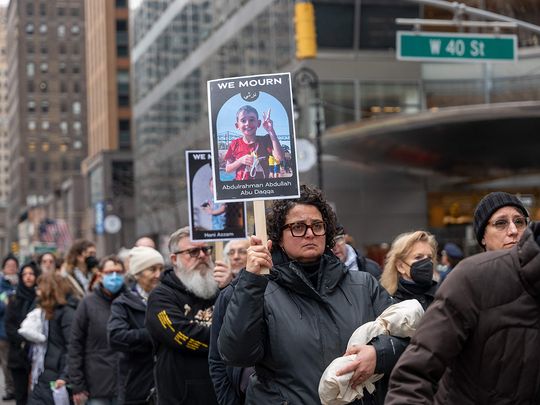
Freedom of speech is often hailed as a cornerstone of liberal democracy, essential for fostering debate, safeguarding individual liberties, and holding governments accountable. The principle of free speech does not advocate for unrestricted expression but rather prohibits the use of force to suppress it, particularly in the realm of political discourse.
It is a principle that, despite its flaws, is deemed superior to alternatives, fostering the exchange of ideas, safeguarding individual freedom, checking governmental power, and ensuring fair elections. However, within liberal societies, a growing illiberal perspective is advocating for restrictions on certain speech, often prioritising group rights over individual liberty or national interests over universal rights.
Despite Sweden having constitutionally guaranteed freedom for more than 250 years, I was labelled as antisemitic by some commentators and media for criticising the Prime Minister of Israel regarding the terrible humanitarian crisis in Gaza. Some even demanded that I be sacked from my university job.
Chinese dissident and artist Ai Weiwei’s art exhibition was cancelled in London in November 2023 due to a social media post regarding the war in Gaza. In the US, campuses have severely cracked down on pro-Palestinian activism, despite many of these campuses being bastions of anti-war movements during the Vietnam War and Iraq War.
These recent trends in both the United States and Europe have raised concerns about the sincerity of their societies’ commitment to this fundamental principle of free speech. While both entities often espouse the importance of free speech on the global stage, their domestic policies and actions tell a different story.
The recent debate surrounding free speech in the West also underscores a significant ideological shift. Traditionally, liberals championed free speech, while conservatives sought to regulate it. However, a reversal of roles has occurred, with liberals increasingly sceptical of free speech and conservatives defending it. This ideological tension highlights the dual nature of free speech, which is both thought and action, each governed by different norms.
Free speech cannot be also absolute and its potential for harm needs to be recognised to prevent violence or protect vulnerable groups. However, this absolutist or restrictive approach fails to fully grapple with the complexities of free speech. Any solution to the problem of free speech must acknowledge its hybrid nature and conflicting norms that govern it.
The United States, long considered a bastion of free speech, has faced growing challenges to this principle in recent years. Political polarisation, media collusion, and censorship on social media platforms have eroded public trust in the freedom of speech.
A 2022 national poll conducted by The New York Times and Siena College found that a majority of Americans no longer believe they enjoy free speech rights, with concerns about self-censorship and fear of reprisals on the rise. This was even before the war in Gaza. Women and younger people, in particular, are more cautious about expressing political opinions, highlighting a chilling effect on public discourse.
Moreover, examples of censorship and suppression of dissent abound across the US. Censorship of art exhibits, legislation to track biased statements, and efforts to regulate bloggers criticising public officials are just a few instances of the erosion of free speech rights.
Both political parties have been implicated in censorship efforts, reminiscent of the tactics of McCarthyism in the 1950s. These trends underscore the seriousness of the threats to First Amendment freedoms and the need to protect free expression as a cornerstone of democracy.
Infringement of freedom of expression
Similarly, the European Union, while advocating for freedom of speech on the global stage, is engaged in speech regulations and restrictions at home. Its legal provisions in the name of protecting democracy from online threats are extremely problematic, with vague definitions of “disinformation” and speech regulations that infringe on freedom of expression.
Some of these measures could lead to overzealous censorship of legitimate speech online, as algorithms tasked with filtering copyrighted material lack the sophistication to effectively make such distinctions.
Furthermore, various European governments, including those of Poland, Hungary, Germany, France, and the UK, have faced criticism for interfering with academic autonomy and restricting free speech within universities. These actions, ranging from legislative proposals to government crackdowns on academic research, have sparked protests and controversies within the academic community and broader society.
Despite these challenges, efforts to defend academic freedom and free expression are underway in both the US and EU. NGOs, human rights organisations, and some governments have taken a stand to safeguard research and education from political interference.
There is no doubt that censorship is harsher in some non-Western countries. Moreover, attacks on free speech are not limited to Western democracies. Globally, governments are implementing measures to combat hate speech, disinformation, and extremism, often at the expense of free expression. The challenges faced by democracies in balancing free expression with social and political issues underscore the importance of protecting freedom of speech as a cornerstone of democracy.
The battle for free speech is ongoing, with challenges emerging from all corners of the globe. While the principle of free speech may be imperfect, its preservation is essential for maintaining a liberal society and protecting individual liberties.
As the world navigates the complexities of the modern era, it is imperative that societies remain vigilant in defending free expression against all threats, both domestic and international.









